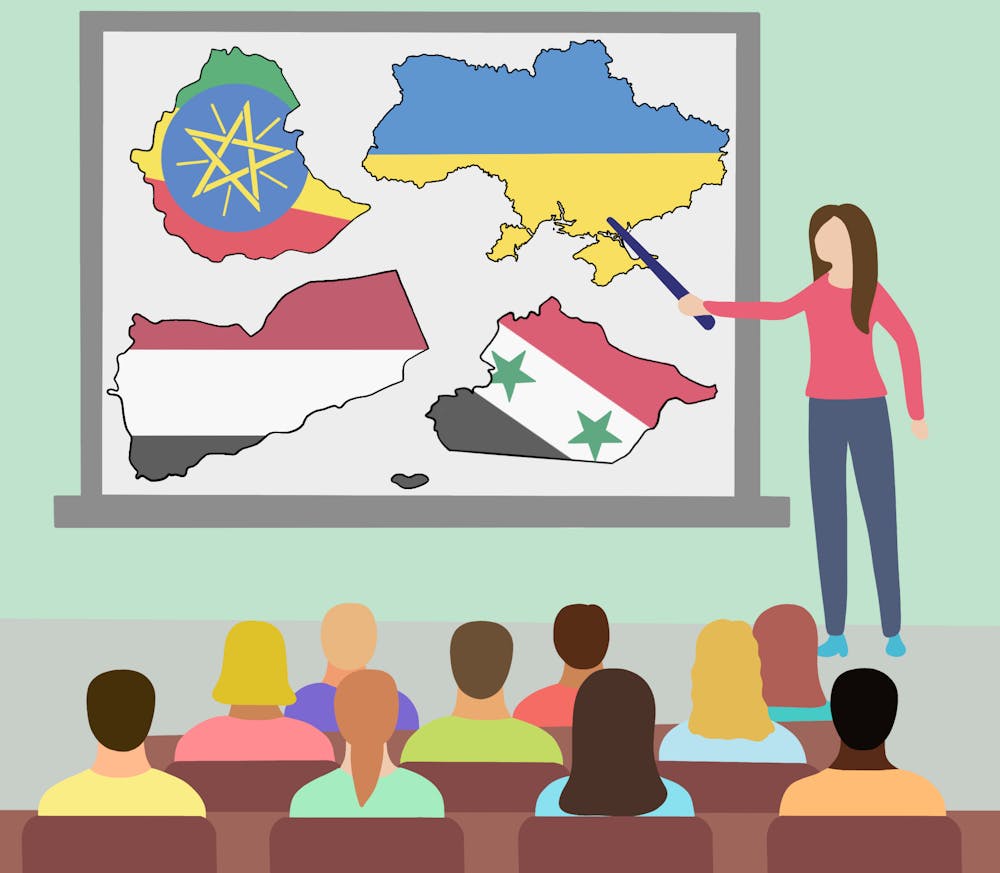This fall, inspired by global awareness of Ukrainians fleeing Russian invasion, Batten Prof. Kirsten Gelsdorf, former policy analysis and innovation chief for the United Nations Office for the Coordination of Humanitarian Affairs, will teach a course with the goal of helping some University students more deeply understand the humanitarian crises facing the world today.
While the course — “Global Humanitarian Aid Crises Response” — is not new, unique to this semester is Gelsdorf’s use of course time to focus heavily on current humanitarian crises such as those in Ukraine, Yemen, Ethiopia and Syria rather than providing students with a merely theoretical overview of humanitarian aid.
Gelsdorf took note of the way the Russian invasion of Ukraine has made national headlines for weeks, and said she updated the course plan to schedule current humanitarian aid workers assisting in the Ukrainian crisis as guest speakers to discuss “some of the current policy and operational challenges.”
The Russian invasion of Ukraine began in February. The conflict stems from the dissolution of the Soviet Union in the 1990s, when Ukraine gained independence — the country has long been divided between Ukrainians who see Ukraine as part of Europe and those who feel it is linked to Russia. In 2014, Russia invaded and annexed Crimea, and tensions have risen since.
Yet the course will not solely focus on Ukraine. As Gelsdorf told The Cavalier Daily, there are 63 countries facing ongoing humanitarian crises identified by the United Nations, and a critical part of understanding humanitarian crises is putting the crisis in context to learn about “knock on effects” in nearby countries. The Ukraine conflict, for example, impacts surrounding countries such as Poland and Belarus as Ukrainian refugees flee to the Polish border and Belarus faces sanctions from both the European Union and the United States for their allyship with Russia.
To accommodate student interest, Gelsdorf always retains flexibility in the course schedule and surveys students on what crises matter the most to them, factoring their responses into the course plan.
“I will always be flexible to where students are in the all in terms of their current interest and questions of the crisis,” Gelsdorf said.
Gelsdorf typically structures her class to first teach students about what the humanitarian aid community learned from recent humanitarian crises and how current models of best practice for humanitarian aid intervention function. Then, equipped with this knowledge, Gelsdorf asks students to complete a number of hands-on simulation assignments as if they themselves were humanitarian aid workers responding to challenging crises.
The syllabus for the course says that the class is centered around the four main principles of humanitarian aid — humanity, neutrality, impartiality and independence.
As the course progresses, students are encouraged not just to complete assignments but to think critically about the topics at hand. Among the skills taught in LPPS 3295 are “working with multiple sources of conflicting or missing information — presenting their positions through evidence and convincing advocacy,” Gelsdorf said.
Abigail Hawkins, third-year College student, took Gelsdorf’s humanitarian aid course in spring 2020. Hawkins doesn’t plan to enter into humanitarian work after graduation, but said the skills learned in the course will be “influential in any field.”
“Even if they aren’t interested in humanitarian aid as a future career, it just helps give anyone a much better understanding of what’s going on in the world, even if they don’t want to make a career out of it,” Hawkins said.
Livie Nute, research assistant for Prof. Gelsdorf and second-year College student, took the class fall 2021 and said it gave her the tools necessary to interpret the unfolding Ukraine crisis, even inspiring her to take a more active role in humanitarian crises overall.
“With each development in the [Ukraine] crisis, I find myself referring back to Gelsdorf's class,” Nute said via email. “Gelsdorf's class has shifted the way I interpret crisis — I understand the many actors and complexities in the suffering that is depicted on the news, and I feel empowered to not just be a passive listener to these stories.”
Gelsdorf too emphasized the importance of studying humanitarian aid not just with a lens to the deeply tragic but open to the ways in which what you learn can empower you to take action.
“I hope my class finds a balance of exploring the difficulties of crisis but also leaves [students] with a path of possibility and optimism in global engagement,” Gelsdorf said.
Manvi Harde, research assistant for Prof. Gelsdorf and first-year College student, said humanitarian aid is often politicized, to the detriment of those in need. Harde is currently working alongside Gelsdorf and a team of other students to produce a podcast, the focus of which is showcasing positive stories relating to humanitarian aid.
Ultimately, Gelsdorf hopes to take students’ existing skills and show students how they can be used to provide help in a world of ongoing humanitarian crises.
“The [world] is being increasingly shaped by crises that have national, regional and global impacts,” Gelsdorf said. “The responses to these crises also offer major opportunities to change policies and practices that could support millions of people.”







